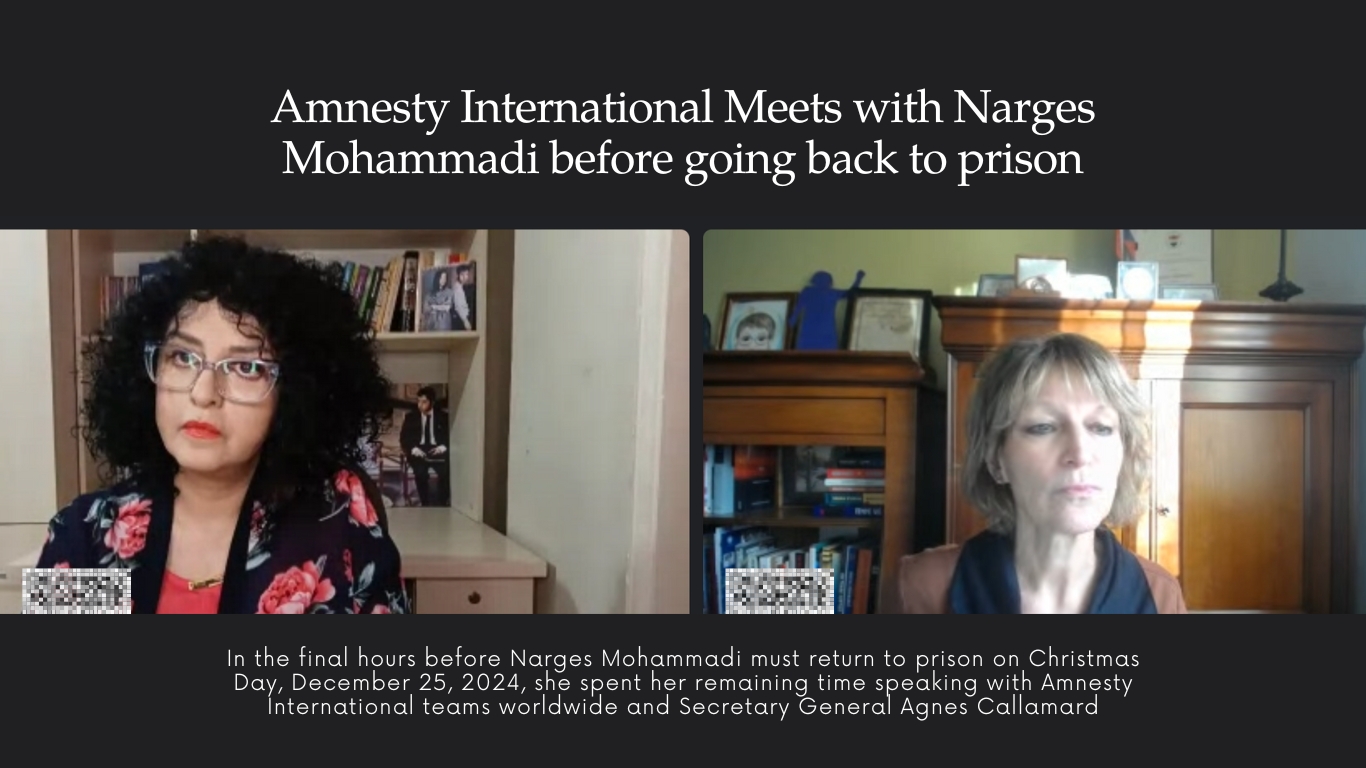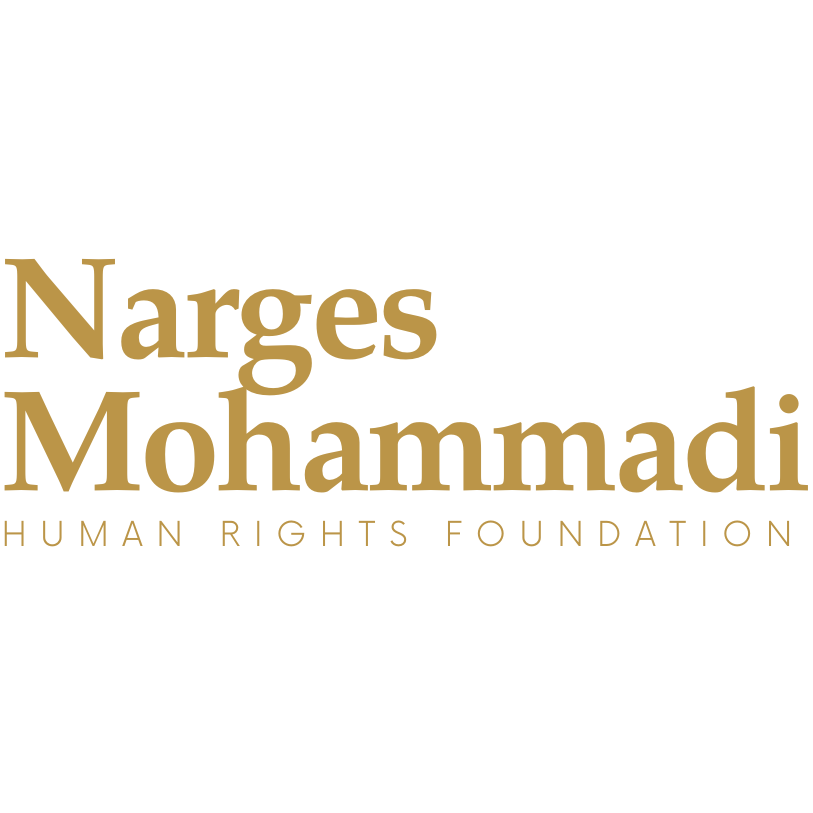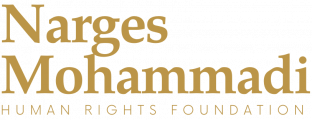
Amnesty International Meets with Narges Mohammadi before going back to prison
23 Dec 2024 – Via Video Call
In the final hours before Narges Mohammadi must return to prison on Christmas Day, December 25, 2024, she spent her remaining time speaking with Amnesty International teams worldwide and Secretary General Agnes Callamard, expressing her gratitude for their efforts and urging them to continue their crucial work on Iran.
Narges Mohammadi started her talk with a message:
“Dear Amnesty teams,
Dear Mrs Agnès Callamard, Secretary General of Amnesty International,
It is an honor to finally meet you, even if only over a video call. As you know, I am currently out on a temporary 21-day sentence suspension from prison. This is not a medical leave, and upon returning, I am required to serve these 21 days again, even though my medical treatment remains incomplete. Doctors have recommended at least 3 months of leave for my condition, yet I was granted only 21 days. I want to express my deepest gratitude to every Amnesty officer across all countries, especially Amnesty Iran, and most of all to you, Mrs. Agnès Callamard, for your relentless efforts. Your work on Iran, on my case, on cases of other Iranian activists, on executions, and on ending gender apartheid has brought so much hope to me and others. Hearing that you responded to my letter about gender apartheid, touched me deeply and gave me hope.
Today, I want to reaffirm that we are in this fight together. Thank you for all that you do. Your efforts give me the strength to endure my days behind bars, to keep fighting, knowing that you are raising your voice to the world while I remain silenced and trapped in prison. I ask you to continue your important work to end gender apartheid—for the women of Iran, Afghanistan, and our sisters across the world. I ask you to continue to demand to stop executions in Iran. As you know, two of my cellmates, Pakhshan Azizi and Varisheh Moradi, are facing execution sentences and I am deeply worried about them.
I have many friends in prison who are ill and in urgent need of medical care, such as Mahvash Shahriari, but they are denied their human rights. I ask you to be their voice.
Thank you.”
Agnes Callamard responded to Narges Mohammadi, saying:
“Narges, we are deeply honored to meet with you today. Knowing you will return to prison in 24 hours is deeply upsetting, as we feel your vulnerability and that of your cellmates behind those walls. While we are not powerless, it’s difficult to measure how much we can help once you’re inside. Your words,however, give us direction and reinforce our commitment to fight for you and every woman in Iran defying the authorities.We want to continue being of use to you and the women of Iran, fighting gender apartheid and monitoring death penalty cases.”
Narges Mohammadi:
“Inside prison, when we protest, fight for our human rights, issue statements, we face harsh repressions—like losing our rights to visitation or telephone—we rely on one key difference from political prisoners of past decades: the voice of institutions like Amnesty International. Your support gives us hope. Resistance without a voice achieves nothing, and you are our voice.
In Iran, women are fighting against religious tyranny, and for this movement to succeed both inside and outside Iran, we must work toward the recognition of gender apartheid. Every time someone asks me what they can do from outside of Iran, I say: fight for ending gender apartheid.
This recognition is not just symbolic; it strengthens our resistance and validates our struggle. The women of Iran and Afghanistan have lived and defined gender apartheid, just as South Africans defined racial apartheid. We have been killed, imprisoned, and endured its weight daily. Now, we need the international community to fulfill its role and stand with us.”
Three years ago, at the height of the “Woman, Life, Freedom” movement, we heard the voices of people from Sistan, Baluchistan, Kurdistan calling for an end to mandatory hijab. Now, seeing the regime retreat from enforcing this very policy is undeniable evidence of its weakness. This step back is a powerful sign of how much the regime’s grip has loosened under the pressure of the people’s demands.”
Nassim Papayianni, head of the Iran campaign for Amnesty International in London:
“Often, when my colleagues and I speak about Amnesty’s work on Iran with activists or at events, we are frequently asked: ‘How does my action impact the situation on the ground in Iran? Does signing urgent actions or joining protests really make a difference?’I know from our work that it does, and I explained this to Ms. Mohammadi. However, I believe it would be even more powerful for activists to hear her thoughts directly, so they can better understand the impact of their efforts.”
Narges Mohammadi:
“I want to emphasize that the people of Iran are striving for democracy, and many groups, both inside and outside the country, are working toward this goal. As human rights defenders worldwide, we must frame human rights as integral to the progress of democracy. A democracy without human rights and women’s rights is not a democracy.In the Middle East especially, we must ensure human rights and women’s rights remain central to these discussions. We have to be a voice for these issues, advocating for them as core principles of any democratic progress.”
Agnès Callamard:
Is there anything we can do for your children? they are truly impressive—a formidable voice for you. You should be so proud of them. But they’re still young.
Narges Mohammadi:
“My only hope is that in the face of the rapid changes likely to unfold in Iran—and their potential impact on human rights defenders—Ali and Kiana will one day be able to forgive me for anything that may happen to me.
I also hope that you, my dear friends in Amnesty, will be there to tell them that I did what I had to do. A few days ago, I spoke with them, and they asked if it wouldn’t be easier for me to just leave the country… I told them I couldn’t, that I still have work to do here. I just hope they can forgive me.”
Agnès Callamard:
“I’m so sorry, Narges. Yes, we know it’s very hard. But I think the children will understand, maybe not today, but deep down, they know. They know why you’re doing what you’re doing. They know the cause that drives you, and they are so proud of you, they will forgive you, and I’m sure they already have. We will tell them how much you love them, and when we meet them, we will remind them that everything you’re doing is for them, to make their country a better place for all the children of Iran.
Narges Mohammadi:
“I ask you to support the people of Iran and be their voice as they struggle for democracy and equality. Whatever happens to me, if I’m in prison or not, I want you to truly hear the Iranian people’s struggle. Achieving democracy and equality in the Middle East would be a monumental accomplishment, and it would not be something small.”
Sylvie Brigot, general director of Amnesty International France, on behalf of Anne Savinel-Barras, president of Amnesty International France:
“You are an inspiration to the French section. We deeply admire your work and your commitment. Every time we speak at public events or discuss gender apartheid, we think of you, as you are always with us in our thoughts and hearts. We also want to acknowledge how strong Ali and Kiana are whenever we have the chance to engage with them. They are incredibly responsible and understand the importance of what their mother is doing. They know what they have to do, and nevertheless, they are the young adults who need our support as well.”
Agnès Callamard:
“I want to tell you that at Amnesty, we have 10 million members and so many of them are dedicated to you personally and to what you represent. They are ready to fight for you, to campaign for you, and for all the women and men in Iran who are standing up to this repression. Iranian women have inspired us for the last two years and even before that. They have been a powerful force in a very dark world. They have shown us what truly matters. You need to be courageous, stand firm on your principles, love the human beings around you, and be prepared to fight for them. You and the women of Iran inspire our work at Amnesty International.
I ask you to be as safe as you can and take care of your cellmates. If you have to go back, we will fight to make sure it’s not for too long. The struggle will continue, and we will be with you. You can count on us.”


